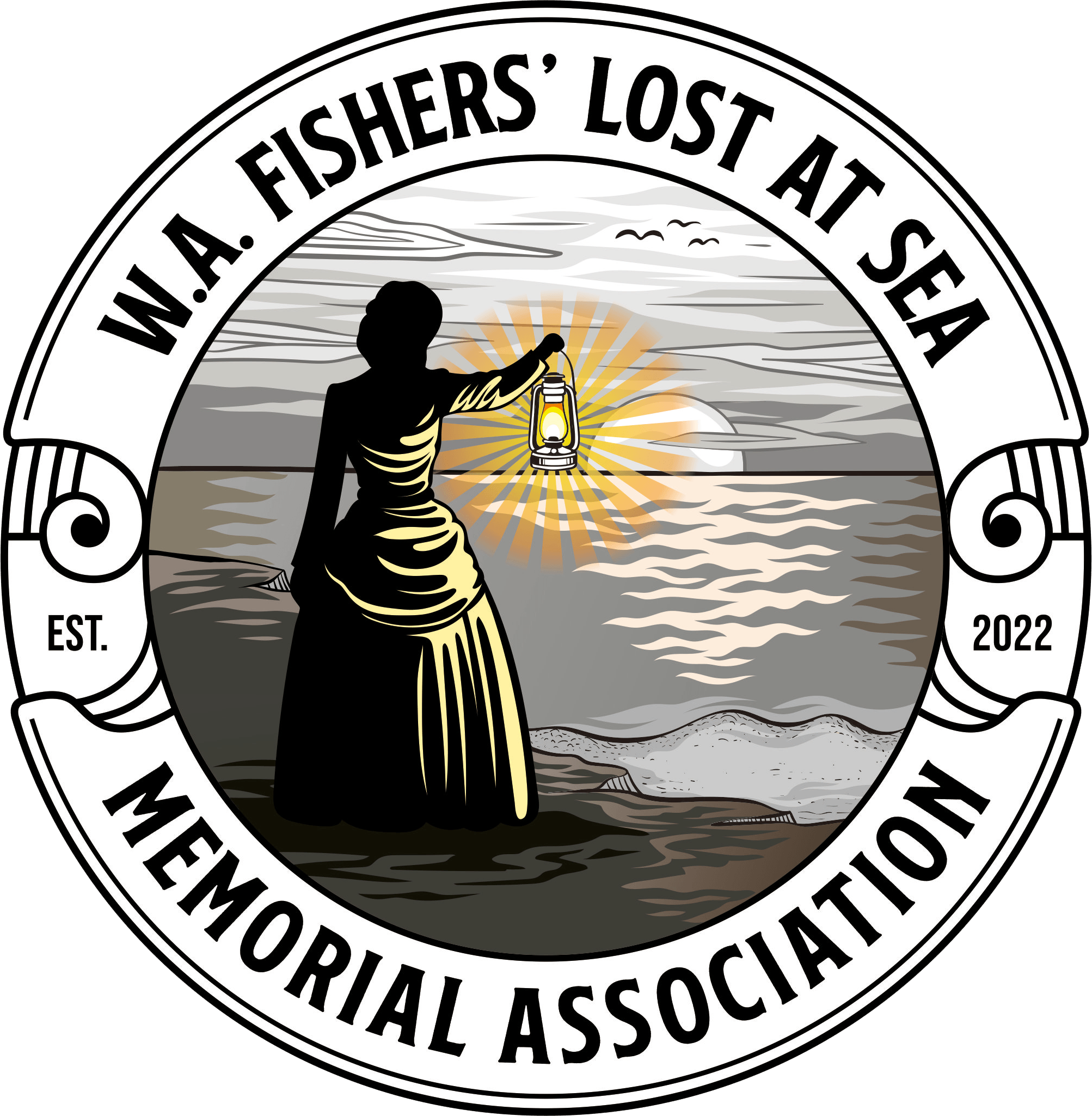Marchese Family
Country of Origin: Italy
Arrival in W.A.: 1901
W.A. Region Settled: Perth-Metro
The Marchese Family of Fremantle as captured by Josephine van der Zanden (nee Capolingua) with excerpts from an Interview with her Uncle, Fortunato (Fred) Marchese.
[Interview with Fortuna (Fred) Marchese] [sound recording] / [interviewed by Jack Darcey].
Duration: 3 parts approximately 30 minutes each
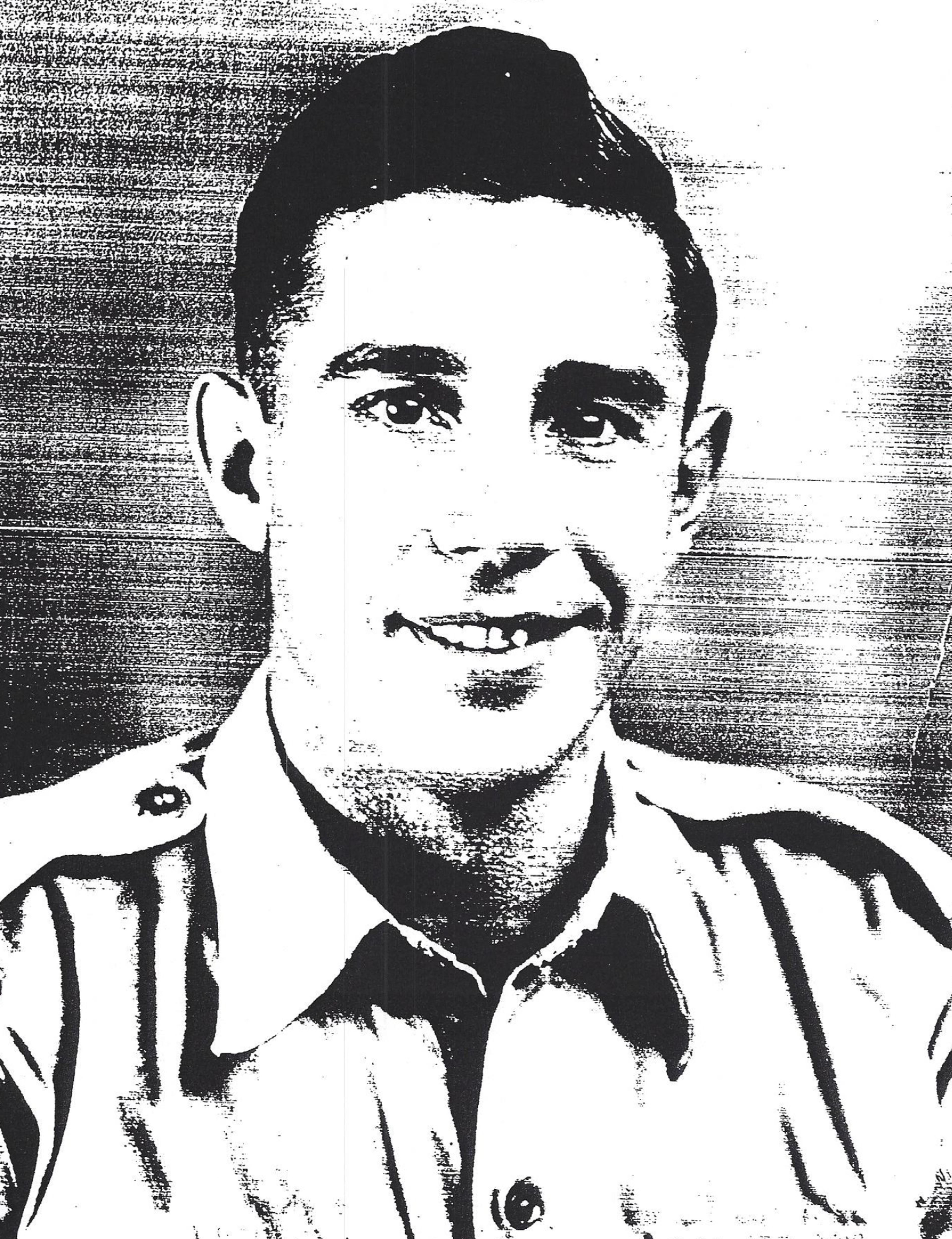
Fortunato Fred Marchese
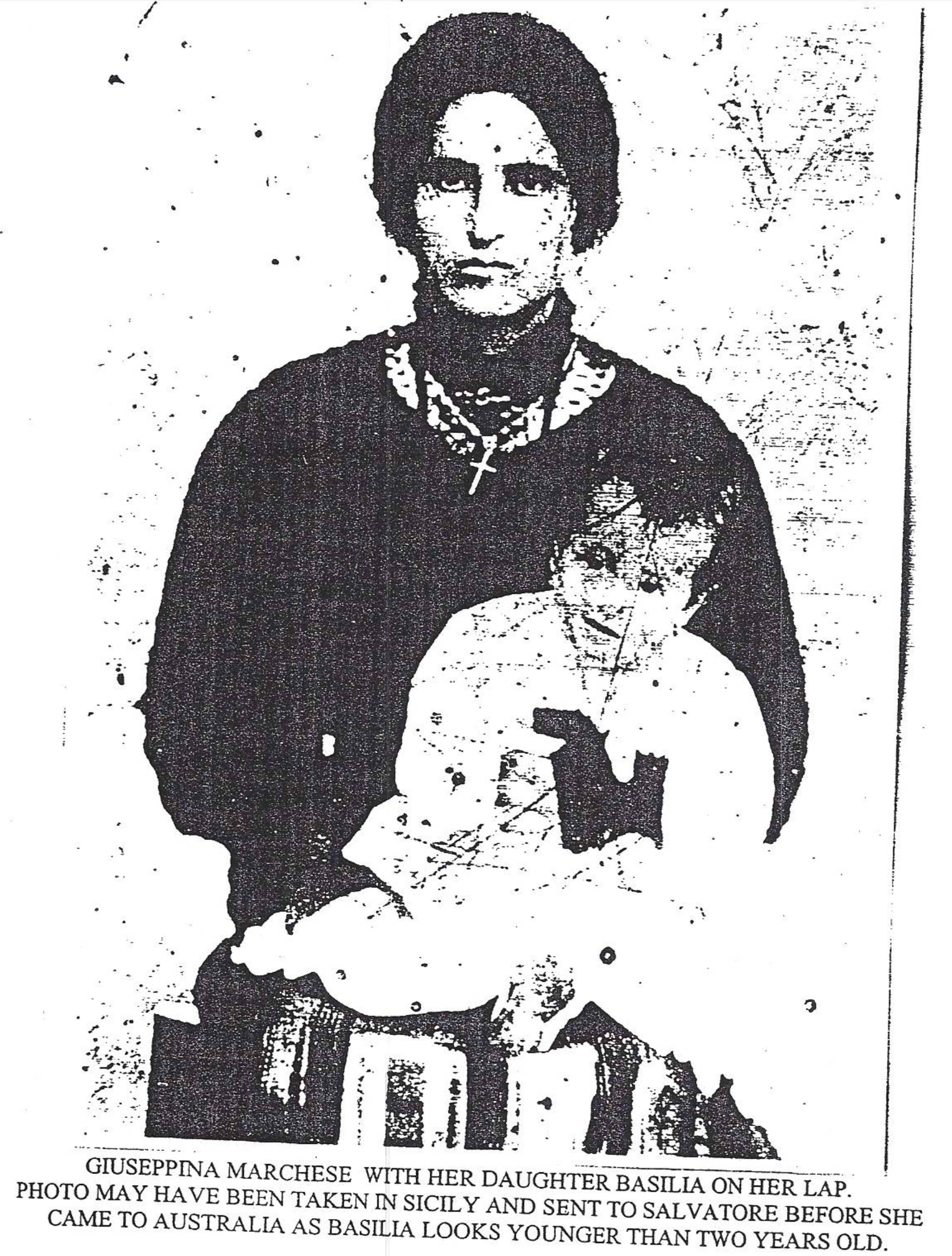
Giuseppina Marchese (nee Travia) with daughter Basilia
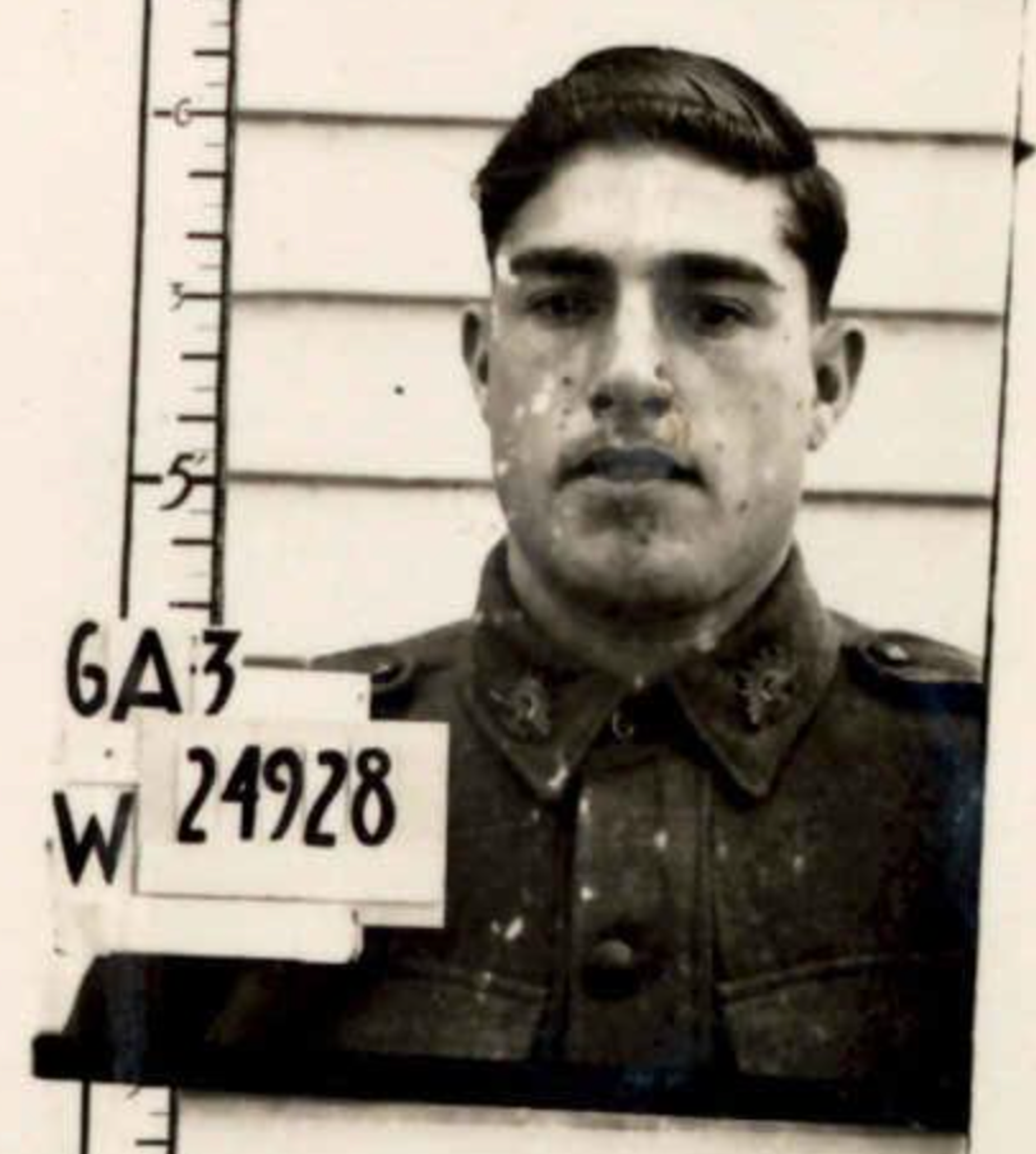
Salvatore Marchese Army Photo
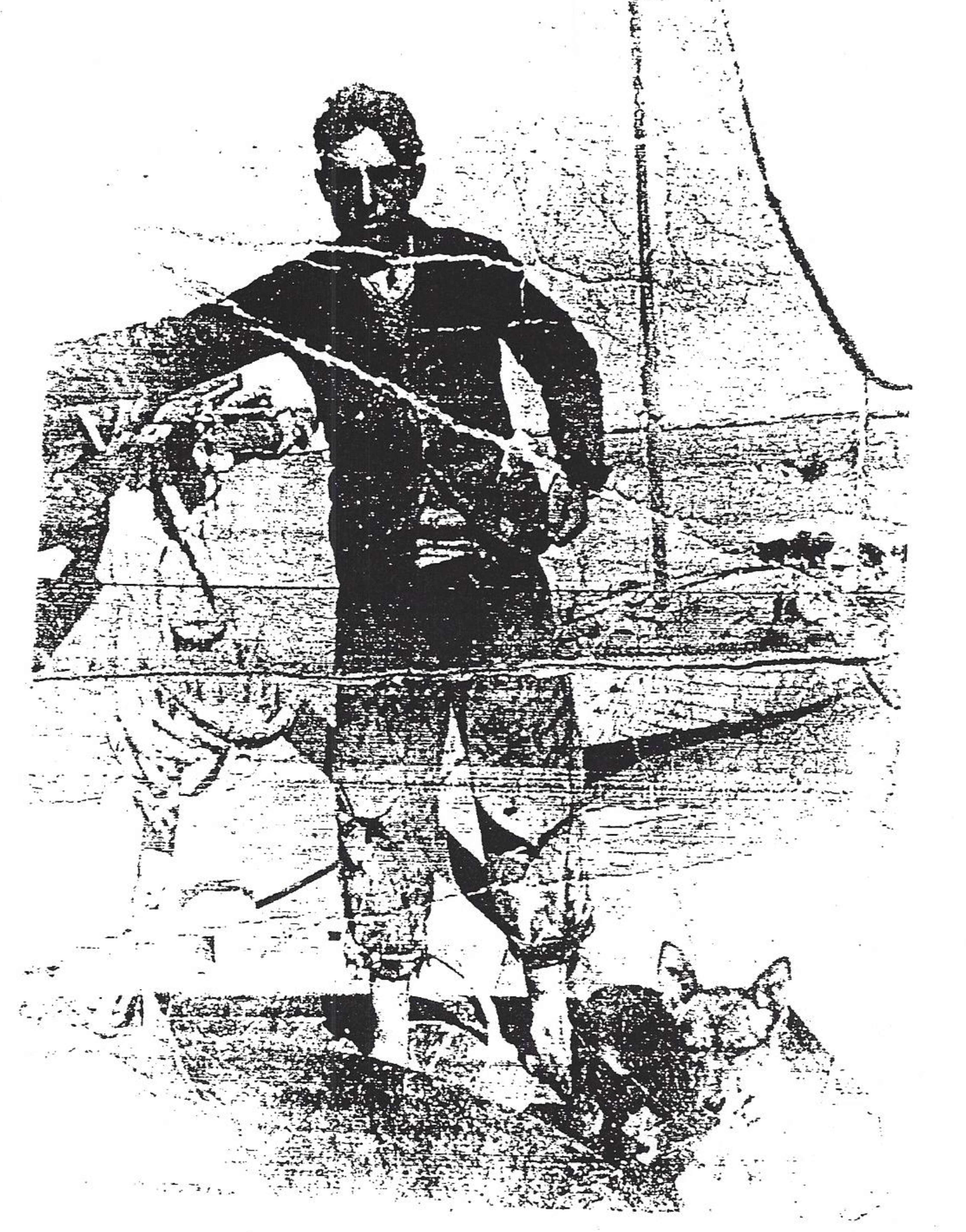
Salvatore Marchese with his Dog
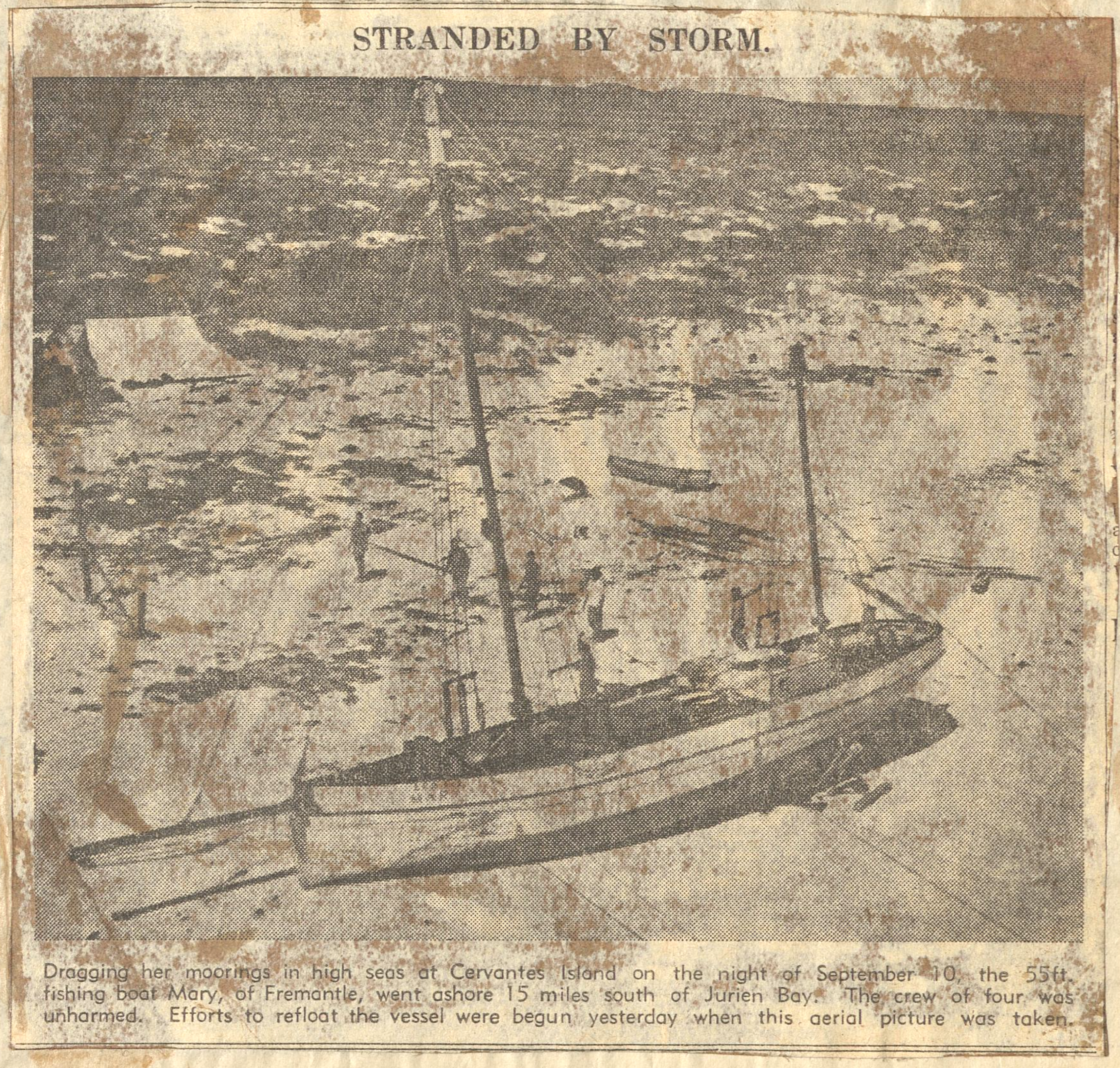
The Mary stranded on Cervantes Island 1946
SALVATORE MARCHESE
BORN 14/04/1879 NASO, CAPO D'ORLANDO. SICILY
DECEASED 30/10/1937, FREMANTLE, WESTERN AUSTRALIA
At the age of 10 years Salvatore went to sea presumably as a cabin boy or deck hand on a Windjammer, (he would have had very little or no education). "Windjammers" were the first sailing ships built of steel by 1885. They were proving sturdier and more economical than the dainty "Clipper Ships", they could carry six times the tonnage with fewer than twice as many crewmen. These vessels were the subject of "tea races" around the world from USA and England to China and back, before being superseded by the Steamers.
Later in life he joined the Navy (perhaps due to National Service) and was assigned to the "Julias Caesar" . While in the Navy he served in China during the Boxer Rebellion. The Boxer Rebellion was a bloody uprising in northern China in 1900 in which hundreds of Chinese and more than 200 persons from other countries were killed. The Boxer Rebellion climaxed a movement in the late 1800's against the spread of Western and Japanese influence in China.
The movement was started by secret Chinese society called I-ho-ch'uan (Righteous and Harmonious Fists). This society was originally connected with the White Lotus sect, which opposed the Manchus, the rulers of China. Westerners nicknamed members of the group Boxers, because they practiced gymnastics and calisthenics. In the 1890's, the Boxers began to oppose the spread of foreign influence in China. Many other Chinese shared these anti- Western feelings, and even the Manchus secretly approved the movement.
In 1900, the Boxers set out to destroy everything they considered foreign. They slaughtered Chinese Christians: missionaries and other persons from foreign countries. and anyone they found who supported Western ideas. They burned houses, schools and churches. When foreign diplomats in Peking sent out calls for troops, the Manchu government declared war against the foreign powers.
Boxers and government troops besieged the legations (official residences of foreign diplomats) in Peking from June 21 to August 14, 1900. Foreign guards, civilians, and Chinese Christians courageously resisted. Finally, a rescue force from eight nations crushed the uprising.
On September 7, 1901, the Manchu government and representatives of 11 other nations signed a final settlement, called The Boxer Protocol. China agreed to execute several officials and punish many others, destroy many forts, and to pay about $300 million in damages. In 1908, the United States returned part of the money it had received, to be used for educational purposes. Britain and Japan later did the same.
Salvatore received a citation after his service in the Navy which may have been presented on behalf of the King of the day, Vittorio Emanuele I. (It is not known why this Citation was given).
At approximately 22 years of age, Salvatore migrated to Australia. At this stage he knew his bride to be, Giuseppina Travia. When he arrived in Australia, he took up working as a Fisherman first in Rockingham (with the Rockingham Fishing Company at Point Peron) then in Fremantle. Back in the early 1900's the Fremantle Fishing Harbour or Marine Harbour came up to the now "Esplanade Hotel". At the end of the day the fishermen would tie up their boats and head for the local drinking hole the "Pier Hotel" on Clif Street to meet and chat with their mates and no doubt spin the odd yarn or two about the fish that got away. Money was by no means plentiful and yet the men did not want to miss out on "their shout" so they would take fish from the catch of the day and exchange this for a jug of beer.
In 1905, while fishing near Garden Island he witnessed the sinking of the Orizaba off the 5-fathom bank. The Orizaba had brought a lot of Italian migrants to Australia. In time he managed to buy his own little crayboat (24 -28 ft) and called it the Malatesta, which was originally called the London Bell. The Malatesta used to line fish and it had a live well too.
In 1909 or early 1910 Salvatore returned to Sicily to marry Giuseppina. They were married on about the 03/02/1910. Salvatore then returned to Australia leaving his wife pregnant with their first child. Giuseppina was living in Capo D’Orlando with her father- in-law Fortunato Marchese. Salvatore was only returning to Australia for a couple of years to earn some money before returning to Sicily to settle down. However, with the onset of World War I he wrote to his wife and asked her to come out to Australia. Giuseppina did not want to come to Australia and did all she could to resist coming here. However, a rather stern letter from Salvatore told her to come to Australia or she would not see him again.
With the onset of World War I, all unnaturalized Australians were no longer allowed to fish for a living, so Salvatore turned his hands to working in the timber mills as a mill hand. Some of the mills he worked in were Jarrahwood, Greenbushes, Mornington Mill, Wellington Mills, Boddington, Jarrahdale and Kirup. While working in the mills he was given the nickname of “Silver”, which would most likely have been an abbreviation of Salvatore to Silvio to Silver.
After the war was over, he returned to fishing in Geraldton and while on a lugger called the "Scotsman" in Sharks Bay, one night he fell overboard. His call for help was answered when a dingy was thrown overboard by Vincenzo Loschiavo who jumped into the dingy and grabbed Salvatore’s hair pulling him to safety. At some point later, Salvatore also held a share with his two friends in the ex-pearling lugger, Rosella.
Salvatore was one of three children that we know of. One of his brothers Santo migrated to Argentina, married and had three sons. His sister Marianna migrated to Australia and lived in Fremantle, she married when she was approximately 40 years of age and never had any children.
Salvatore died aged 58 years. He apparently had a fall after which he was diagnosed with stomach cancer (the fall probably revealed the cancer) and given 4 months to live. He died on in 1937. His death certificate states that he died from Carcinoma of the Liver and Heart Failure.
Salvatore was known to be a very stubborn man, very demanding of his children and his word was final. In his last months of life, a more gentle and caring character emerged after realising how hard he had been on his wife and family. He was survived by his wife and seven of his nine children;
His eldest was Basilia, she was born in Italy in 1910 and came Australia at the age of two in 1912 with her Mother Giuseppina. Santo was born in Fremantle in 1914. He was a Fisherman and worked on the Capo D’Orlando with Bert Miragliotta and Steve Lo Presti. He servied in the Australian Army in World War II. He married Nina Triscari and died prematurely in 1963. His siblings Vincenza and Fred were born at Wellington Mills, she was born in 1916 and Fred was born in 1918. Fred also served in the War. Silvio, (or Salvatore), was born in Geraldton in 1922. Silvio was the third of the Marchese brothers to serve for Australia in World War II. Tragically, Silvio lost his life when the Mary sank off Cervantes Island in 1946. Joe was born in Fremantle in 1925. Mary, the youngest, was born at Mornington Mills in 1928. There were two other children that passed on as infants. One was Marianna and the other, the boy, was Antonio.
GIUSEPPINA (GIUSEPPA) MARCHESE NEE TRAVIA
BORN 18/02/1883 NASO, CAPO D'ORLANDO. SICILY
DECEASED 09/01/1971 FREMANTLE WESTERN AUSTRALIA.
Giuseppina was a young girl of 16 years when her older sisters who were
married decided to migrate with their families to America. (This was probably about 1899, and there was a huge migration of Italians/Sicilian who were going to America, Argentina and Australia. Jobs were scarce and new opportunities were sought in new lands). Vincenza Travia, the matriarch of the family who was widowed, was asked to go with them. Giuseppina refused to go to America because she was betrothed to her beloved Salvatore (who was probably in the Navy) and wanted to await his return to marry him. So, she remained in Capo D’Orlando with an aunt.
When Salvatore eventually returned from Australia, Giuseppina was 27 years of age. They were married, then Salvatore decided to return to Australia to make some money and return to Sicily (it was never his intention to settle in Australia for good). While he was away in Australia his first child Basilia was born. Giuseppina eventually joined her husband in Australia in 1914 with their daughter Basilia who was two or three years old. The sad part about this story is that while Giuseppina was on her way to Australia, she did not know her Mother was sailing from America to visit her in Sicily. Giuseppina was never to see her mother or sisters Giovanna, Antonina, Maria, Lucia and brother Antonino again. Traveling on board the ship from Italy to Fremantle with Giuseppina and Basilia were Nunzia (Nancy) Iannello and Nina Cicerello and her son Steve, both well-known names in Fremantle. All these families knew one another and were part of a strong Italian Community, many family members still friends till this day. When World War 1 broke out and Salvatore was no longer allowed to go out to fish for a living, they moved in and out of the timber towns where many of their children were born. Then after the war when Salvatore returned to fishing, they moved to Geraldton for a while and eventually back to Fremantle. Basilia was the only child born in Capo D’Orlando. Santo followed, born in Fremantle. Vincenza, Marianne (lost in infancy) and Fortunato were all born in Wellington Mills. Antonino was born in Fremantle and also died in infancy. Salvatore was born in Geraldton. Giuseppe was born in Fremantle and the second child named Marianne was born in Mornington Mills.
Giuseppina was my Nonna whom I was named after and as I was 23 years of age when she passed away, I have some very fond memories of her, though I also thought, at times, she was interfering in our upbringing as teenagers. Of course, what teenager would not think that someone who insisted the hem line was too short when miniskirts came in, was an old fuddy duddy. I remember her knitting to be so perfect that it was as if done by machine, she knitted all of nonno's socks. She could sit for ages with an article of clothing and pound it with her hand till it looked as though she had ironed it. Do you remember the cups of tea she could drink and the number of biscuits she would dunk in her tea? If you didn't remove the packet she could eat the lot. She never turned food down, one day as a young kid I was experimenting in the kitchen with a sponge cake and somehow halfway through the preparation I mixed up the recipe on the self-raising flour pack. Having turned it around and ended up with scones. Well they were as dry and hard as a rocks, but nonna enjoyed the dunking and ate most of the scones. Do you remember how she would stand and wash her hand under hot running water for ages and scraping the bars of soap with her nails as she went, she had the smoothest hands, yet having a bath was never seen as a necessity. I remember her wailing for her son Silvio (refer to https://www.flatsea.org/fishing-lives-lost/stories/mary) and later for her son Santo, life certainly dished out a very large serving of pain for her. But in all her pain she was conscious of those living. Giuseppina was very traditionally Italian. She loved her family and while communication was difficult for her with many of her grandchildren, she was fond of all of them. Nonna was particularly fond of my brother Gae, and while she only spoke a few words of English, he taught her the good old Aussie word "bugger" he would call her a "cheeky bugger" and she would respond with laughter "no you cheeky bugger" she always enjoyed this little banter of words. I look back and see a very strong woman who was a true pioneer of Australia, she toiled hard and did the very best with what she had to raise her family. She never lost her faith and was never afraid to die.
In the latter years of her life her memory gave way to dementia and had very bad arthritis. She spent the last couple of months in a nursing home. I returned from Melbourne after six months away and was saddened to see her, she did not recognise me and she had her hair cut, she had never had her hair cut in her life. She died some weeks later at Nazareth House, Hilton (Fremantle) on the 11/01/1971. She was survived by five of her nine children.
In 1989, Salvatore and Giuseppina’s son, Fortunato (Fred), gave an interview as part of the oral history segment of the History of the Australian Fishing Industry. Prior to his service in the Australian Army during World War II, Fred worked in the fishing industry, both afloat and ashore. When he left school, he began fishing with his cousin (Guiseppe Marchese) on the Lavina. Post-war, Fred worked on the Fremantle waterfront and was a prominent member and committee man of what became the Painters' and Dockers' Union. He was a close associate to the late Paddy Troy who's name will be long
remembered in Fremantle. (See story – Paddy Troy and his influence on the Fremantle Fishermen’s Cooperative).
Fred’s full interview can be accessed at https://purl.slwa.wa.gov.au/slwa_b1842953_1
In one segment, he details the activities at the Fremantle Fish Markets during the Depression…
"….When I was in the 11, 12 until I was about 13 1/2. I used to go down and help my late uncle. He used to supply fish to hotels in Perth and other areas also. And of a morning, because there was nothing for my brothers and me to get up as early as half past four, half past five, and go down the markets. I used to push my uncle's cart because he used to pay me ten shillings [$1] a week and buy me clothes. And it used to be a real eye-opener to see how life was. My late.... a cousin of mine, or cousin of my mother's, his name was Peter Travia, he used to open the market up of a morning.
DARCEY Is this Perth or Fremantle?
MARCHESE Fremantle, yes. And the people he was working for was Willis and Grieve.
They were auctioneers or accountants, whatever. And he'd open the market and is used to be quite comical of a morning. They used to have what they called a sliding door, he used to get through a portable door first, get inside, and open the sliding door. But it used to be quite comical because the men that were fishing, they wanted to get places on the tables for their fish, and of course thy'd all be pushing on the door and there'd be a bit of cursing and so on going on. But eventually the door would be pushed open. It was a sliding door, and it used to be quite comical. There'd be men running, dogs following them, and of course a lot of fishermen would have their paddle in their hand because they used to scull their dinghies to their boats, and they'd fling themselves on the table to get a position on those tables. And of course they'd try to get the closest....
DARCEY To the auctioneer's office?
MARCHESE To the auctioneer, see? Which was the nearest to the office. And, of course, during this time there'd be fish coming in; the fishermen would be pushing their trolleys - there used to be a trolley on the train line. They used to go out to the end of the jetty, load the trolley and they used to take it off near the.... where the market was, see. And, of course, it was Depression time and one of the things that I'm always reminded, is the people that came out of the Esplanade, where they had been sleeping all through the night. And it was really sad because those poor people, they had nowhere to go, there was no work for them. And if I told you they slept under the trees, of course when it rained - well they had to run for cover where possible.
And, of course, people would then be there to do their buying. You'd have people come from all the areas from Perth, maybe sometimes a bit further up, all along the stations between Perth and Fremantle. And, of course, once again prices were very limited, as I think I mentioned to you earlier…."
Story Contributors
Josephine van der Zanden
Fred Marchese
James Paratore
